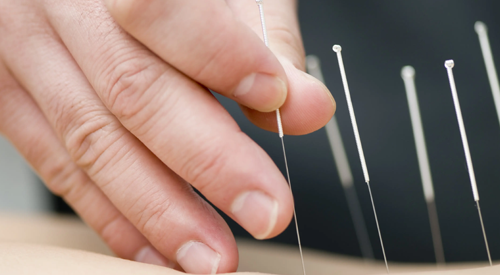Acupuncture May Reduce Hot Flashes in Patients With Breast Cancer Undergoing Endocrine Therapy
Findings from this study also demonstrate statistically meaningful improvements in breast cancer–specific quality of life and endocrine symptoms with acupuncture.
Acupuncture May Reduce Hot Flashes in Patients With Breast Cancer Undergoing Endocrine Therapy

Patients with hormone receptor (HR)–positive breast cancer who underwent acupuncture experienced statistically significant and clinically meaningful reductions in hot flashes, according to findings from a pooled analysis study published in the American Cancer Society–based journal, Cancer.1
A pooled analysis of 3 clinical trials found that patients who received immediate acupuncture (IA), consisting of 20 acupuncture sessions over 10 weeks, had statistically significant improvements in endocrine symptom subscale scores (mean change ± standard error, 5.1 ± 0.9; P = .0003), hot flash scores (–5.3 ± 0.9; P < .003) and Functional Assessment of Cancer Therapy (FACT)-Breast total scores (8.0 ± 1.6; P = .0005). Patients who received delayed acupuncture control (DAC), which included those who received usual care for 10 weeks and crossed over to weekly acupuncture sessions, had smaller changes in endocrine symptom scores (0.2 ± 1.0; P = .0003), hot flash scores (–1.4 ± 0.9; P < .003), and FACT-Breast total scores (–0.01 ± 1.6; P = .0005).
“By managing [adverse] effects, our approach makes it easier for patients to continue their prescribed medication, which has the potential to reduce the risk of cancer recurrence and improve long-term outcomes for breast cancer survivors,” lead author Weidong Lu, MB, MPH, PhD, from the Department of Medical Oncology at Dana-Farber Cancer Institute, said in a press release on these findings.2 “In practice, patients interested in using acupuncture for this purpose might begin with a short trial period to assess their response to the treatment, particularly in terms of reduction in hot flashes and other symptoms. If the trial period yields positive results, patients may then engage in a long-term program, receiving regular acupuncture sessions throughout the duration of their anti-hormonal medication regimen.”
The primary end point of the study was total change in endocrine symptom subscale scores from baseline to week 10. Secondary end points included changes in weekly hot flash scores, the response rate defined by the proportion of patients with a reduction of 50% or greater in hot flash scores between baseline and week 10, and total changes in FACT-Breast subscale scores and Trial Outcome Index from baseline to week 10.
From January 2019 to February 2022, investigators conducted 3 independent parallel randomized controlled trials at Dana-Farber Cancer Institute in the United States (n = 78; NCT03783546), Daegu Catholic University Medical Center in South Korea (n = 40; KCT0003618) and Jiangsu Provincial Hospital of Traditional Chinese Medicine in China (n = 40; ChiCTR2100045888); which encompassed the overall population of the analysis (n = 158). IA and DAC arms numbered 81 and 77 patients, respectively. Each site used the same core acupuncture protocol, eligibility criteria, and study measures but worked with local regulatory groups for approval and oversight.
Of the 158 patients, 136 (86%) completed study measures by week 10. Discontinuation after randomization occurred due to time commitments or disruptions associated with COVID-19, with 12 (15%) in the IA arm and 10 (13%) in the DAC arm withdrawing before 10 weeks. Investigators observed no serious treatment-related adverse effects in either arm.
Inclusion criteria across all sites included histologically or cytologically confirmed stage 0 to III HR-positive breast cancer with any HER2 status and completion of surgery and any chemotherapy or radiation therapy. Additional criteria included having current adjuvant endocrine treatment, with or without suppression of ovarian function, for 4 or more weeks at study entry and persistent hot flashes for 4 weeks with at least 14 on average each week in the week prior to screening.
References
- Lu W, Giobbie-Hurder A, Tanasijevic A, et al. Acupuncture for hot flashes in hormone receptor‐positive breast cancer: a pooled analysis of individual patient data from parallel randomized trials. Cancer. Published online June 14, 2024. doi:10.1002/cncr.35374
- Can acupuncture lessen hot flashes and other side effects of anti-hormonal breast cancer therapy? News release. Wiley. June 24, 2024. Accessed July 2, 2024. https://tinyurl.com/mpe4apkv
Nurse Practitioners Weigh in on Data From the San Antonio Breast Cancer Symposium
January 16th 2023Loyda Braithwaite, MSN, RN, AGPCNP-BC, AOCNP; and Jamie Carroll, APRN, CNP, MSN, highlight presentations from the 2022 San Antonio Breast Cancer Symposium that will influence oncology nursing practice.


